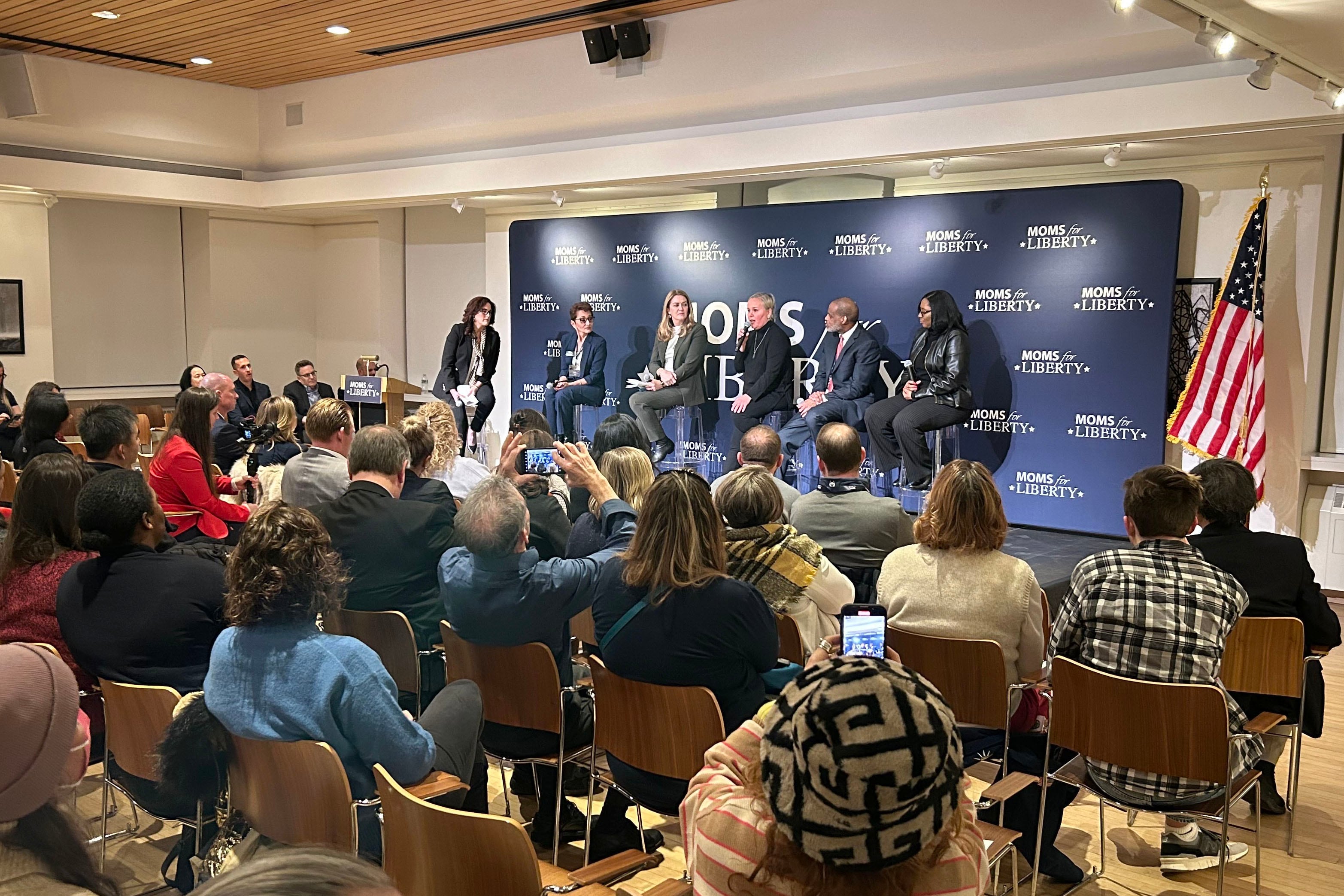Sign up for Chalkbeat New York’s free daily newsletter to keep up with NYC’s public schools.
Months after schools Chancellor David Banks removed a controversial parent leader from a Manhattan education council, a federal judge this week ordered she be temporarily reinstated to her position pending the outcome of an ongoing lawsuit.
Maud Maron, a member of the Community Education Council in Manhattan’s District 2, was removed from her post in June for allegedly violating city regulations governing the conduct of parent leaders. That decision followed months of critics calling on the city to take action against Maron, who is affiliated with the right-wing group Moms for Liberty and has been embroiled in several high-profile controversies over the past year.
The court order issued on Tuesday could have far-reaching implications for the city’s process overseeing parent leader conduct. U.S. District Judge Diane Gujarati raised concerns that the city’s regulations may be unconstitutional and could breach the First Amendment, which prohibits the government from infringing on free speech.
In the order, Gujarati said there was a “clear and substantial likelihood” that parts of the regulations were overly broad and vague and could discriminate against certain viewpoints. Gujarati granted a temporary injunction reinstating Maron to her council position pending the result of a lawsuit against the city’s Education Department. (Maron is one of the plaintiffs in the lawsuit.)
The city’s Education Department also paused enforcement of parts of the regulations last month, as it seeks to revise them to address concerns raised by the lawsuit, according to the court order.
Maron was a sponsor of a resolution District 2′s council passed in March calling on the Education Department to reconsider its guidelines allowing transgender students to join sports teams that align with their gender identities — which sparked national media attention and sharp condemnation from Banks. That followed texts she had sent in a private group chat denying the existence of transgender children, according to The 74. Earlier this year, she also called an anonymous student at Stuyvesant High School, where Maron is a parent, a “coward” and accused them of “Jew hatred” in response to an opinion piece published in the school newspaper.
Maron’s statements about the Stuyvesant student were cited in the city’s decision to remove her from her council position, according to the court order. City officials argued her statements violated regulations that prohibit parent leaders from making “derogatory or offensive comments about any DOE student,” as well as forbidding “conduct that serves to harass, intimidate, or threaten, including but not limited to frequent verbal abuse and unnecessary aggressive speech that serves to intimidate and causes others to have concern for their personal safety.”
Both of those provisions likely run afoul of the First Amendment, according to Gujarati.
The judge’s decision comes as a reversal of one of only two removals from the city’s parent councils in recent history. Under state law, the chancellor has the authority to remove members from local parent-led councils, but it’s unclear if any chancellor had exercised that power before Banks took action in June.
At the time, Banks also removed Tajh Sutton, the former president of the council in Brooklyn’s District 14, from her position for allegedly violating open meetings laws. (Sutton and District 14′s CEC are also named as defendants in the lawsuit, which alleges that they and the city’s Education Department are misusing the grievance process and suppressing the voices of some parent leaders.)
As part of the preliminary injunction granted Tuesday, the court also temporarily prohibited District 14′s council from enforcing some of its internal policies and from “discriminating against speakers at CEC 14′s public meetings on the basis of viewpoint and/or political association.” It also blocked the council from restricting access to its official account on X, the social media platform formerly known as Twitter.
In a statement over email, Maron said she was “thrilled with the judge’s decision.”
“There is more work to be done to make sure the DOE does not silence dissenting parents, but this is a great first step,” she said.
Nathaniel Styer, a spokesperson for the city’s Education Department, said the department was “disappointed by a ruling that limits our ability to protect students from harmful conduct by parent leaders.”
“Even prior to the court’s ruling, we began reviewing the applicable Chancellor’s regulation and are preparing to propose revisions and initiate our public engagement process,” he said in an email. “We will also continue to support CEC 14 towards complying with its legal requirements. We will continue to review the ruling for next steps.”
Sutton did not immediately respond to a request for comment.
Julian Shen-Berro is a reporter covering New York City. Contact him at jshen-berro@chalkbeat.org.






